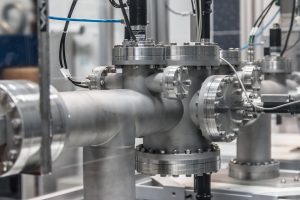Boilers are essential in the day-to-day operations of various food processing companies. From cooking the food, cleaning and sanitizing the materials and equipment, to powering the machines, this heating process is used in a multitude of operations.
This heating process, however, is criticized by environmentalists due to the use of fossil fuels. We’re all aware that these resources won’t last forever. So the need for a new and more efficient boiler control system is essential, not only for the food processing company but also for our environment.
How Does a Boiler Work?
A steam boiler is a device that produces boiling water or steam for use in various processes. For devices that produce high-pressure steam exceeding 290 psi, the steam generator is a more acceptable term.
A steam boiler or steam generator has three main components:
- The water feed system
- The fuel system
- The steam system
The water is turned into boiling water and steam using various types of fuels. In turn, the generated steam is collected and distributed to the processes that require heat.
Various fittings provide feedback on all of the parts of the systems comprising the steam boiler/generator. The main feedback fittings are valves and pressure gauges. The safety of the boiler is provided by the valves and gauges.
Improvement in technology has paved the way for the more efficient operation of boiler systems by providing remote sensors in addition to, or as a replacement for, the gauges. Valves are replaced by pneumatic switches or other switching devices that automatically close or open when needed.
Steam boilers are used in industrial applications like the generation of electric power, conversion of heat to mechanical energy, heating. The food industry uses heat from the steam in many of its processes, including cooking. In agriculture, steam boilers are used for soil sterilization or soil disinfection.
Food Processing Industries that Uses Food Boilers
In the food industry, various processing sectors utilize food boilers for their daily operations. These include the food processes for:
- Vegetable processing
- Poultry processing
- Meat processing
- Beverage processing
- Food processing and packaging
Fuel Used for Boiler Operation
The food boilers used in the industry generally use fossil fuels to generate hot water and heat for different processes. These include:
- Fuel oil
- Natural gas
- Coal
- Biomass
But in today’s environmentally conscious society, the use of these fossil fuels by various industries is increasingly discouraged. These fossil fuels won’t be here forever. Additionally, the costs for these natural gases could increase in the future as the supply decreases, and the demand rises.
Coal power plants are slowly being closed down and decommissioned. Meanwhile, more states are passing mandates to reduce natural gas use and promote more renewable energy.
The Importance of Improving Boiler Efficiency
Adapting to a new boiler control system could be critical to a more efficient and cost-effective process to reduce the overall energy use during boiler operation.
Integrating advancements in technology like using software with various boiler control operations can optimize the use of the whole system. This could help reduce the use of fuels by up to 10 percent. While this doesn’t seem like much, the payback will become evident after a few months of operation.
Business operations can be more efficient, with less energy and money wasted. This could be the future for all food processing companies.










